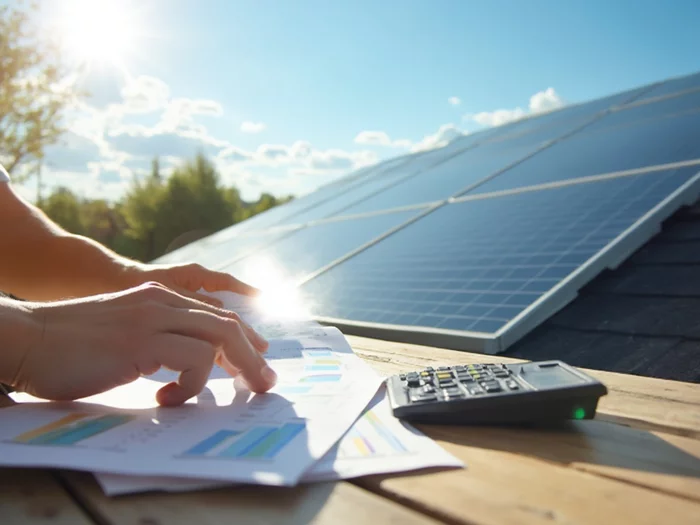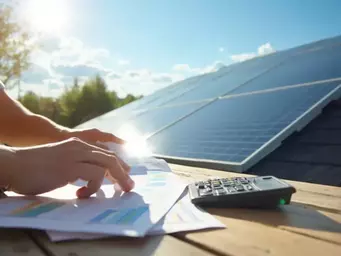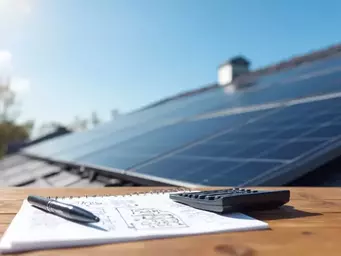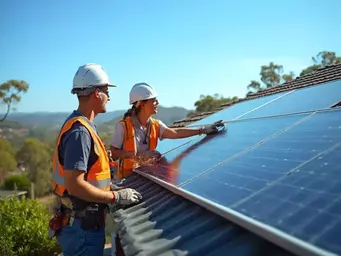Upfront Costs (Initial Investment)
- Solar Panels
- Inverters
- Installation Labor
- Permitting & Fees
Requires immediate capital or financing
Unlock expert insights on solar panel installation, energy savings, and government rebates for Australian homes and businesses. Join our community of informed solar enthusiasts!
Posted on: 2025-10-14
By: Evelyn Tran
Ready to unlock the potential of solar energy for your home? Understanding the financial landscape of solar installation is key to making informed decisions that benefit both your wallet and the environment.
Understanding the immediate costs and ongoing benefits is crucial for a successful solar investment. This visual breaks down the financial components.
Requires immediate capital or financing
Generates savings and value over time
When considering solar energy, one of the first questions I hear from homeowners is about the cost of solar panel installation. It's crucial to understand the financial aspects involved before making a commitment. From the initial investment to potential savings, I’ll guide you through what to expect financially as you embark on your solar journey with Longi Solar Solutions!
Solar installation costs can vary widely based on various factors. Generally, you should anticipate expenses related to the solar panels themselves, inverters, installation labor, and additional hardware. Knowing these components will help you make informed decisions as you move forward.
To give you a clearer picture, let’s break down the typical costs associated with solar panel installation. Here are the major components you should consider:
By understanding each of these components, you can better prepare for the expenses associated with your solar installation. For more detailed insights into the cost benchmarks of photovoltaic (PV) systems, you can refer to reports from organizations like the National Renewable Energy Laboratory (NREL), which often publish data on solar PV system cost benchmarks, offering a comprehensive overview of the financial landscape.
Planning your budget effectively is key to a successful solar installation. Here are some essential strategies I've found helpful for homeowners:
These strategies can help you create a realistic budget while maximizing the value of your solar investment. For a comprehensive resource on understanding solar energy for your home, including financial considerations and benefits, the U.S. Department of Energy offers a valuable Homeowner's Guide to Solar.
It’s essential to distinguish between upfront costs and ongoing expenses when budgeting for solar. Upfront costs include the purchase and installation of the system, while long-term expenses may involve maintenance and potential replacement costs. Understanding the full scope of these financial obligations will empower you to make informed decisions.
Additionally, calculating your expected energy savings can give you insights into how long it will take to recoup your investment. This approach is vital for assessing the overall financial health of your solar project.
Financing your solar installation can make it more affordable. Here are some common financing options to consider:
Each option has its pros and cons, so consider what aligns best with your financial situation and goals.
Don't forget to evaluate available solar tax incentives and local rebates. These programs can significantly reduce your upfront costs, making solar more accessible. For instance, many Australian homeowners can benefit from federal and state programs that provide rebates or tax credits. Keeping up to date with these incentives ensures you capitalize on every potential saving!
I always recommend consulting with a tax professional to get a comprehensive understanding of what you might qualify for, as these incentives can change frequently. The U.S. Department of Energy's website also provides information on solar photovoltaic system cost benchmarks, which can help homeowners assess the current market and potential savings from incentives.
To maximize your savings on solar installation, consider timing your purchase with local incentive programs or seasonal promotions. Many solar companies offer discounts during specific times of the year or in conjunction with government rebate schedules. This strategic approach can significantly lower your upfront costs and enhance your return on investment!
As we wrap up our discussion on solar budgeting and energy savings, it’s vital to underscore the importance of a well-planned solar investment. A thoughtful approach to budgeting not only maximizes your financial returns but also enhances your overall energy efficiency at home. By understanding the costs involved and leveraging available incentives, you position yourself for long-term savings and sustainability.
Here are some key benefits of investing wisely in solar energy:
By focusing on these advantages, you can confidently navigate your solar journey and make informed decisions that benefit both your wallet and the environment!
Ready to take the plunge into solar energy? The next steps toward installation can feel overwhelming, but I'm here to simplify the process for you. Start by assessing your current energy needs and understanding your home’s suitability for solar panels. This is crucial for determining what type of system will best serve you!
Here’s a step-by-step action plan to guide you:
Taking these steps will set you on a clear path towards solar installation, allowing you to harness the power of renewable energy effectively!
Are you curious about the cost of going solar? One powerful tool at your disposal is a solar cost calculator. These calculators can help you estimate your potential savings by inputting your energy usage and local electricity rates. With Longi Solar Solutions' resources, you can find calculators tailored to the Australian market, ensuring you get accurate estimates!
Here are some benefits of using solar cost calculators:
Using these calculators not only helps in planning your finances but also empowers you with knowledge about your solar options!
Staying updated with the latest solar developments is essential for making informed decisions. The solar industry is continually evolving, from new technologies to changing policies. I recommend following trusted sources, subscribing to industry newsletters, and regularly visiting platforms like Longi Solar Solutions to stay in the loop!
To help you stay informed, consider these strategies:
By engaging with these resources and communities, you can make the most of your solar journey and ensure that your investment continues to pay off!
Finally, conducting an energy audit is a smart step towards greater energy savings! This process identifies areas where you can improve efficiency, potentially lowering your energy bills even further. An energy audit typically assesses factors such as insulation, appliance efficiency, and overall energy consumption.
Here’s a simple checklist to conduct your energy audit:
By completing an energy audit, you’ll gain valuable insights into your energy use and pinpoint opportunities for optimization. This proactive approach not only supports your transition to solar but also contributes to long-term sustainability!
Here is a quick recap of the important points discussed in the article:

 Ready to unlock the potential of solar energy for your home? Understanding the financial landscape o
Ready to unlock the potential of solar energy for your home? Understanding the financial landscape o
 As you contemplate the shift to solar energy, consider this: a comprehensive understanding of the co
As you contemplate the shift to solar energy, consider this: a comprehensive understanding of the co
 Choosing the right solar installer can significantly impact your renewable energy journey. Are you r
Choosing the right solar installer can significantly impact your renewable energy journey. Are you r